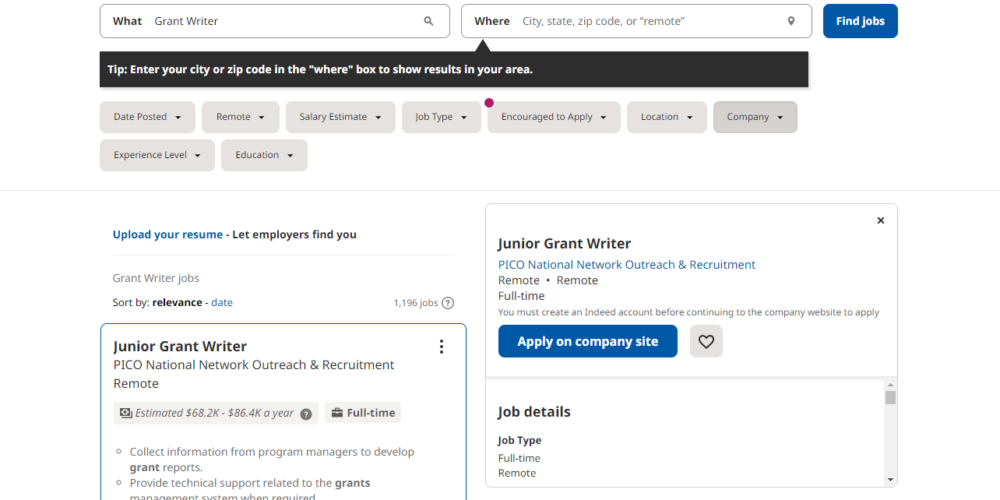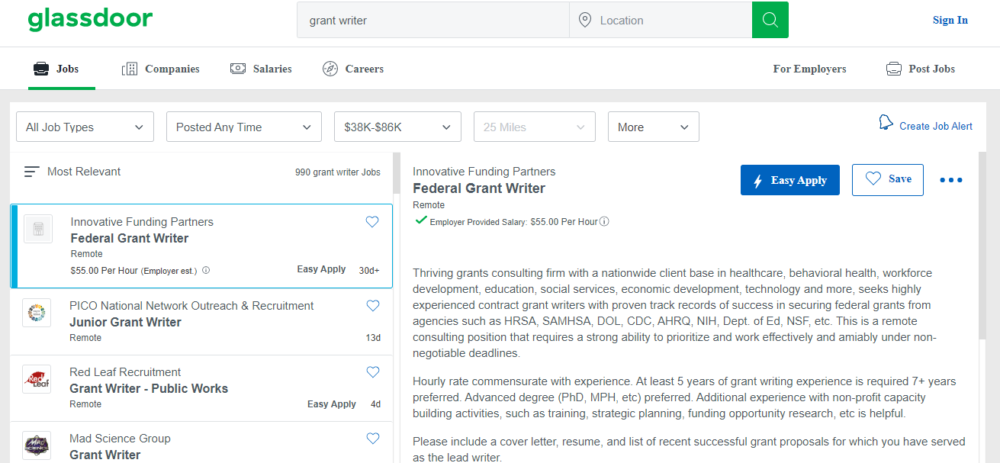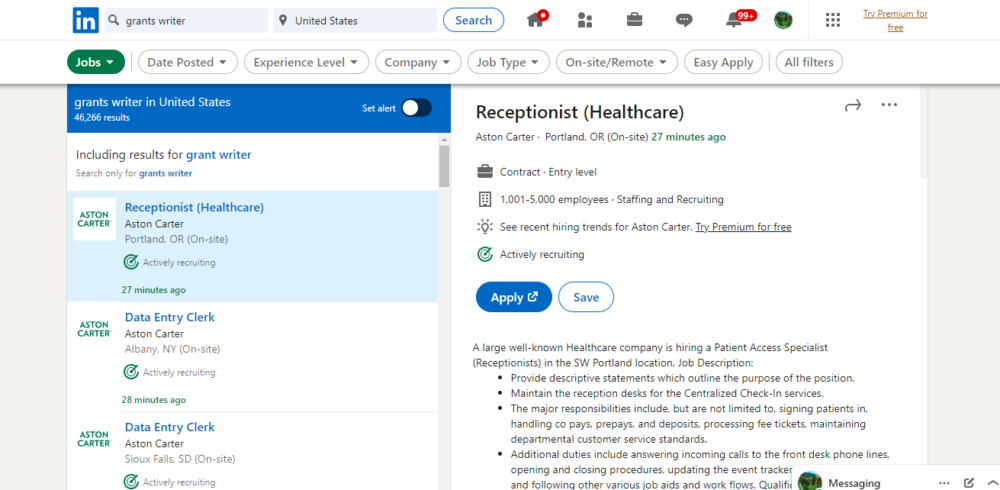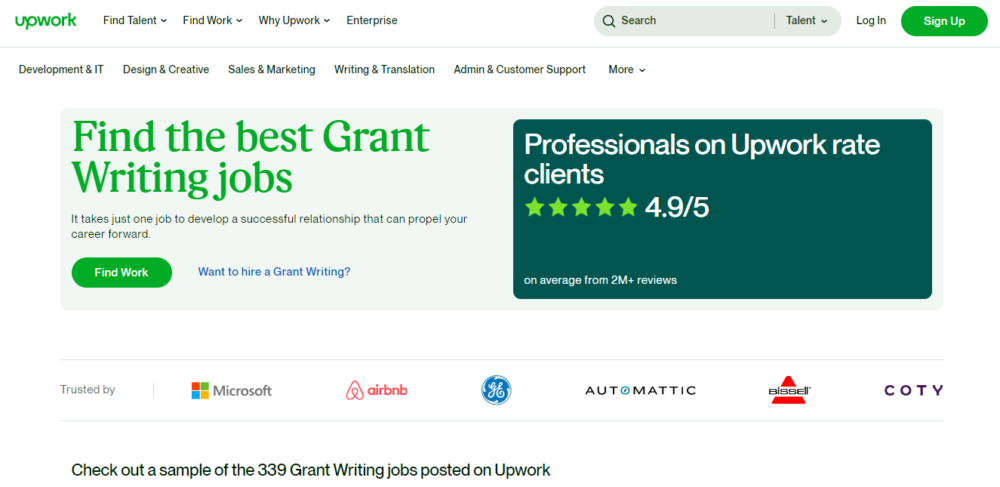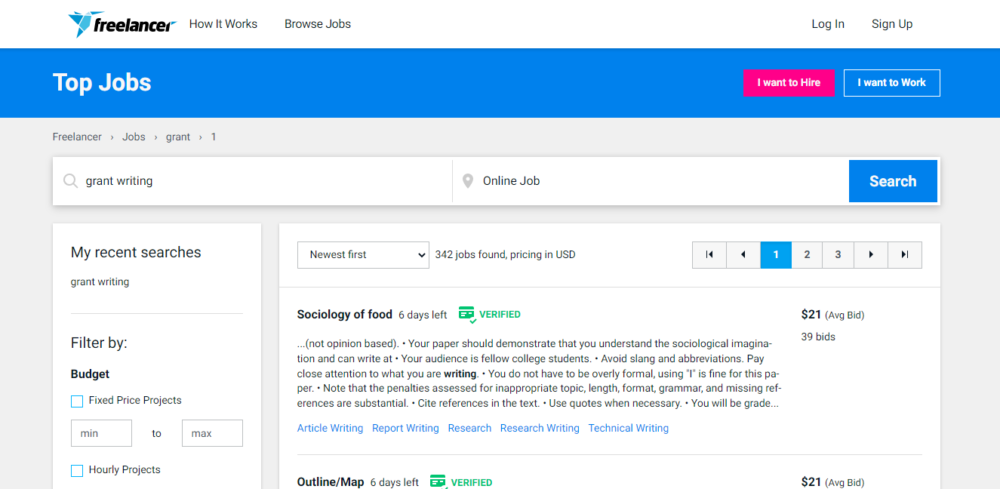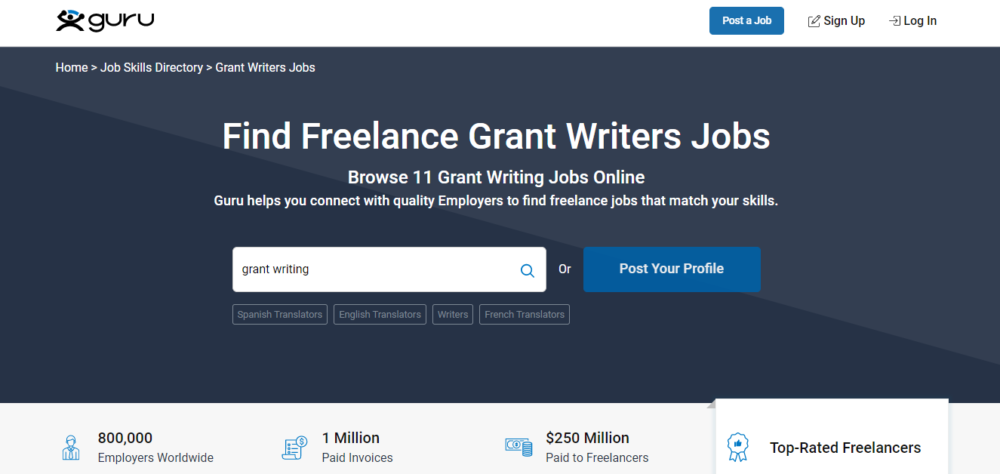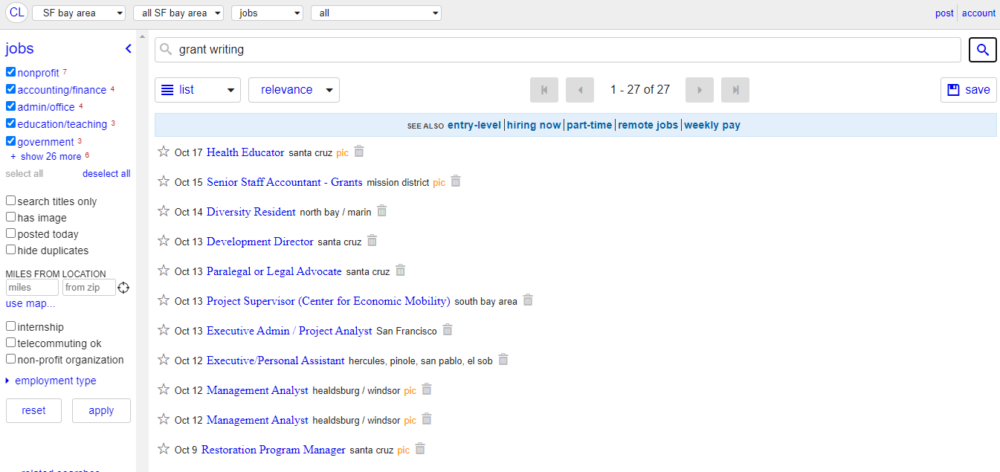Do you want to know how to become a grant writer? It’s a great career field to get into! This blog post will outline 14 steps to help you become a grant writing pro.
We’ll cover everything from understanding the grant writing process to building your professional network. So whether you’re just starting or looking for ways to improve your skills, this post is for you!
What is a grant writer?
A grant writer is a professional who specializes in writing grant proposals. Grant writers typically work with nonprofit organizations, schools, and other entities that rely on funding from government agencies or private foundations to support their operations and programs. Grant writers typically have a research, writing, and project management background.
Role of a grant writer
The primary role of a grant writer is to develop and write grant proposals. They work closely with organizations to understand their needs and goals and identify potential funding sources. Grant writers also research the grant-making organization and the specific funding opportunities. They also develop budgets and write project timelines.
💔 Break up with bad clients: There are better clients waiting for you. And SolidGigs can help you find them. Get a team of gig-hunters and a custom dashboard. Starting at just $31/mo. Learn more »
In some cases, grant writers may also be responsible for managing the grant process once the proposal has been submitted. This can include communicating with the funder, collecting required documents, and ensuring that the organization meets all the grant requirements.
Grant writers typically work on a contract basis. A single organization or consultants may employ them for multiple organizations. Some grant writers also work for foundations or government agencies.
What is the salary of a grant writer?
There is no one-size-fits-all answer to this question, as grant writers’ salaries can vary depending on their experience level, the type of organization they work for, and their job location.
However, according to the Bureau of Labor Statistics (BLS), the median annual salary for all writers and authors was $61,510 in 2021. This means that half of all writers and authors earned more than this amount, while the other half earned less.
Grant writers starting their careers can expect to earn less than those with more experience. According to Payscale.com, entry-level grant writers earn a median salary of $42,000 per year, while those with five to 9 years of experience earn a median salary of $53,000 per year. Experienced grant writers who have been in the field for 10 to 20 years earn a median salary of $59,000 per year, while those with 20 or more years of experience earn a median salary of $63,000 per year.
The type of organization a grant writer works for can also affect their salary. Grant writers who work for nonprofit organizations typically earn less than those who work for for-profit companies.
According to the BLS, the median annual salary for all technical writers was $78,060 in May 2021. However, according to ZipRecruiter, grant writers who work for nonprofit organizations earn a median salary of $57,586 in October 2022.
The location of a grant writer’s job can also affect their salary. Grant writers who live and work in large metropolitan areas typically earn more than those who live and work in small towns or rural areas. Grant writers who live and work in New York City earn a median salary of $60,319 in 2022, according to the ZipRecruiter.
What qualifications and skills are required to be a grant writer?
Although there are no formal education requirements, most grant writers have at least a Bachelor’s degree. In addition, they should have excellent writing, research, and communication skills. Below are some suggestions about education and skills if you want to know how to become a grant writer.
Education requirements
As mentioned above, most have at least a bachelor’s degree. In addition, many grant writers have taken business writing, English, communications, or journalism courses.
Some grant writers have a Master’s degree in Business Administration (MBA), Public Administration, or a related field. These are all educational degrees that can help you be a more qualified grant writer, and potentially earn more, however, having an advanced degree is not required to be a successful grant writer.
Skills and qualifications
In addition to having excellent writing skills, grant writers need to be able to research and communicate effectively. They should also be able to work independently and meet deadlines.
Other essential skills and qualities for grant writers include:
- Strong attention to detail
- Organizational skills
- The ability to multi-task
- Time management skills
- Research skills
- Critical thinking skills
- The ability to work under pressure
- The ability to take constructive criticism
- The ability to work independently
- The ability to meet deadlines
If you’re considering a career in grant writing, ensure you have the skills and qualifications required for the job. With the right skills and qualifications, you can become a successful grant writer and help organizations receive the needed funding.
How to become a grant writer in 14 steps
These steps will help you to learn how to become a grant writer even if you have no existing experience.
1. Research the field of grant writing
It will help you to ensure it is a good fit for your skills, interests, and goals. Many books and online resources available can give you an overview of the grant writing process and what it entails.
2. Consider your education and experience
To become a grant writer, you’ll need at least a bachelor’s degree, although many employers prefer applicants with a master’s degree or higher. You should also have significant writing experience and experience in the field in that you’ll be writing grants.
For example, if you want to write grants for a medical research organization, it would be helpful to have experience working in the medical field.
3. Develop your writing skills
As a grant writer, you’ll need to be able to write clearly and concisely. Be sure to brush up on your grammar and punctuation, and take some time to practice writing persuasively.
4. Learn about the grant-writing process
There’s more to writing a successful grant proposal than simply putting pen to paper (or fingers to keyboard). To be successful, you’ll need to understand the process of applying for grants, including how to find potential funding sources and what information needs to be included in your proposal.
5. Professional development courses
Consider completing a grant writing course or certification program. Although not required, this training can help you learn the skills needed to be a successful grant writer.
Many professional development courses can help you learn the skills you need to be a successful grant writer. These courses can be found online and offline and range in price from free to several hundred dollars.

6. Get some experience
While you may be able to get a job as a grant writer with no experience, it will likely be more challenging to land a good position without some previous experience. To gain some experience, consider volunteering to write grants for a local nonprofit organization or taking on a small project for a friend or family member.
7. Develop a strong writing portfolio
You will likely be asked to provide writing samples when applying for jobs. Having a well-rounded portfolio that showcases your grant writing skills is essential.
8. Network with individuals in your field
Attend conferences, workshops, and other events that focus on grant writing. This will help you meet others in the field and learn about new opportunities.
9. Start your own grant-writing business
This can be a great way to level up your career and work schedule. When starting, you may want to consider working with a grant writing partner or joining an existing firm.
10. Volunteer your grant writing services
This is a great way to get experience and build your portfolio. You can also use these opportunities to network and make contacts in the field.

11. Get involved with professional organizations.
These organizations offer many resources, including job boards, networking events, and continuing education opportunities.
12. Pursuing advanced education in grant writing or a related field
Consider pursuing advanced education in grant writing or a related field. This can help you further your career and stay current on trends in the field. There are many online and campus-based programs available.
13. Meet requirements
When you land a job, meet with your supervisor regularly to discuss your progress and get feedback.
This will help you fine-tune your skills and become the best grant writer you can be.
14. Stay up to date
The world of grant writing is constantly changing, so it’s essential to stay abreast of new developments. Consider joining a professional organization, such as the Grant Professionals Association, and attending conferences and workshops on grant writing. Reading grant-writing publications and blogs is an excellent way to stay informed.
Is the grant writer industry hard to break into?
The grant writing industry can be quite challenging to break into. There are a few key reasons for this.
First, the industry is quite competitive. Many individuals and organizations are vying for the same grant money. This can make it difficult to stand out from the crowd.
Second, the grant writing industry often requires a great deal of experience and knowledge. Many grant writers have years of experience in the field. They know what donors are looking for and how to write a winning proposal. This can make it difficult for newcomers to get in the door.
Third, the pay for grant writers can be pretty low. Many grant writers work on a freelance basis and are paid per project. This can make it challenging to make a good living as a grant writer.
Despite these challenges, it is possible to break into the grant writing industry. The key is to be persistent and to stand out from the competition. You can succeed in this rewarding field with a little hard work.
What are the day-to-day tasks of being a grant writer?
Assuming you are talking about a professional grant writer, the day-to-day tasks vary depending on the type of organization they work for and the stage of the grant process. Generally, a grant writer will:
1. Identify potential funding sources
2. Write proposals to foundations and other donors
3. Develop budgets
4. Write reports to donors
5. Manage the grant process from start to finish
6. Keep track of deadlines
7. Work with a team of colleagues, including program staff and senior leadership
The grant writer’s job is to package the organization and its programs in a way that appeals to potential funders. This involves understanding both the organization and the funding landscape. To be successful, grant writers must be excellent communicators, detail-oriented, and well-organized. They also need to understand fundraising basics and have a passion for their work.
The pros & cons of being a grant writer
Working as a grant writer can be an enriching career. You are helping others to obtain the funding they need to make their goals and dreams a reality. However, there are also some potential drawbacks to the job that you should be aware of before deciding to pursue it.
PROS
1. You can make a real difference in people’s lives.
2. It can be a very flexible job, allowing you to work from home or another location of your choice.
3. You can choose your hours and work as much or as little as you want.
4. There is a lot of potential for growth in the field.
5. Grant writing can be very lucrative, with some grant writers earning six-figure salaries.
CONS
1. The competition for grant writing jobs can be fierce.
2. It can be very stressful, as you often work under tight deadlines.
3. You need to have strong writing skills and be very detail-oriented.
4. It is essential to have a good understanding of the grant-making process.
5. You need to be knowledgeable about a wide range of topics.
Where to find grant writing gigs
There are many ways to become a grant writer. There are plenty of websites that post-grant writing jobs and many different ways to get the training needed to be a successful grant writer. Here are several websites where you can find grant writer jobs.
1) Indeed
Indeed is a job search engine aggregating job postings from various sources, including company websites, job boards, and newspapers. To find grant writer jobs on Indeed, search for “grant writer” in the search bar. You can also search for grant writing jobs by location and filter the results by date posted, job type, and salary.
2) Glassdoor
Glassdoor is a website that allows users to submit reviews and salaries for various jobs anonymously. To find grant writing jobs on Glassdoor, search for “grant writer” in the search bar.
3) LinkedIn
LinkedIn is a social networking site for professionals. To find grant writing jobs on LinkedIn, search for “grant writer” in the search bar and select the “Jobs” tab. Alternatively, you can browse LinkedIn’s job postings by selecting the “Jobs” tab from the top menu.
4) Upwork
Upwork is a website that connects freelancers with clients. You can search for grant writing jobs by keyword and filter the results by budget, skill level, and more.
5) Freelancer
Freelancer is a website similar to Upwork, where freelancers can connect with clients. You can search for grant writing jobs by keyword and filter the results by budget, skill level, and more.
6) Guru
Guru is another website that connects freelancers with clients. You can search for grant writing jobs by keyword and filter the results by budget, skill level, and more.
Pro Tip: There are also many online job boards that list grant writing jobs and other types of positions in the nonprofit sector. Some of the most popular include Idealist, Philanthropy News Digest, Grant Writers Directory or GrantStation, and GrantSpace. Check these sites regularly, and don’t forget to set up alerts to notify you as new jobs are posted.
7) Craigslist
Craigslist is a website that allows users to post classified ads for free. To find grant writing jobs on Craigslist, select your city or region from the list of Craigslist locations and search for “grant writer” in the jobs section.
Additional ways to find grant writing jobs
In addition to the methods mentioned above, there are many other ways you can find grant writing jobs. Here are a few to consider:
1. Networking
One of the best ways to find grant writing jobs is through networking. Get connected with people in your field and let them know you’re interested in grant writing. Attend conferences, join professional organizations, and participate in online forums related to your work. You never know who might be able to point you in the right direction.
2. Personal Contacts
If you know someone who works for a nonprofit organization, don’t be afraid to ask if they’re aware of any open grant writing positions. Many times, these types of jobs are not publicly advertised but are instead filled through personal contacts.
3. Professional placement firms
Some firms specialize in placing individuals in nonprofit jobs, including grant writing positions. While you will likely have to pay a fee to use their services, it may be worth it if you’re having difficulty finding a job on your own.
4. Grantmakers
It can’t hurt to go to the source and contact grantmakers directly to inquire about open positions. Many of them have staff dedicated to working with grant writers and may be able to point you in the right direction.
5. Online Resources
Many online resources can help you find grant writing jobs. For example, the Foundation Center’s website offers a searchable database of grantmakers and a directory of grant-writing consultants.
6. State Job Banks
If you’re looking for a government job, don’t forget to check your state’s job bank. Many states have positions available for grant writers, especially at the local level.
7. Classified Ads
Although it’s not as common as it once was, you can still find grant writing jobs advertised in the classified section of your local newspaper or online.
8. Job Fairs
Job fairs are a great way to meet employers and learn about available positions, including grant writing jobs. Check with your local Chamber of Commerce or professional organization to see if any job fairs are scheduled in your area.
9. Direct Mail
Another old-fashioned but still effective method for finding grant writing jobs is to send a direct mail inquiry to nonprofits in your area. They will often be happy to let you know if there are any open positions.
10. Volunteer
One way to get your foot in the door is to volunteer with a nonprofit organization that relies heavily on grant funding. Not only will you be able to learn about the grant writing process, but you may also be in an excellent position to apply for a paid position when one becomes available.
11. Internships
Many nonprofits offer internships to give students and others hands-on experience in the grant writing process. These can be great opportunities to learn about the field and make meaningful connections.
12. Temp agencies
If you’re having difficulty finding a full-time grant writing job, you may want to consider working with a temp agency. This can allow you to try out different positions and see if grant writing is the right fit.
13. College career centers
If you’re a college student or recent graduate, your school’s career center can be an excellent resource for finding grant writing jobs. They may have listings for positions and information about upcoming job fairs.
14. Professional organizations
If you’re a member of a professional organization, such as the American Grant Writers Association or the National Council of Nonprofits, you may be able to find grant writing jobs listed on their websites. These organizations offer job postings, networking opportunities, and professional development resources.
15. Social media
Social media can be a great way to connect with potential employers and learn about available grant-writing jobs. LinkedIn is a handy tool for this purpose. You can also search Twitter using relevant hashtags, such as #grantwritingjobs.
Takeaway
Finding grant writing jobs can be challenging, but finding positions that are a good fit for your skills and experience is possible. Using the tips and resources above, you can increase your chances of landing a job in this competitive field and help organizations get the funding they need.
Are you interested in becoming a grant writer? What are your thoughts on the 14 steps on how to become a grant writer we outlined? Let us know in the comments below.
Keep the conversation going...
Over 10,000 of us are having daily conversations over in our free Facebook group and we'd love to see you there. Join us!


